Related Research Articles
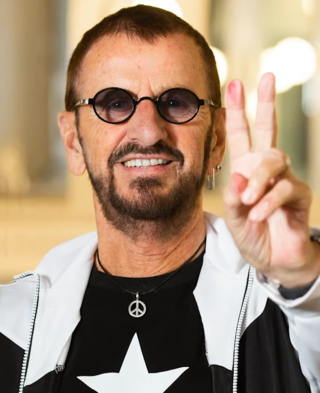
Sir Richard Starkey, known professionally as Ringo Starr, is an English musician, songwriter and actor who achieved international fame as the drummer for the Beatles. Starr occasionally sang lead vocals with the group, usually for one song on each album, including "Yellow Submarine" and "With a Little Help from My Friends". He also wrote and sang the Beatles songs "Don't Pass Me By" and "Octopus's Garden", and is credited as a co-writer of four others.
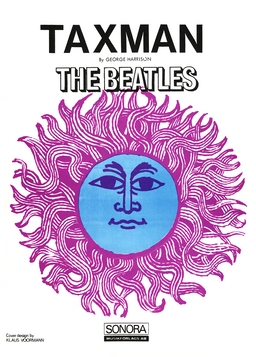
"Taxman" is a song by the English rock band the Beatles from their 1966 album Revolver. Written by the group's lead guitarist, George Harrison, with some lyrical assistance from John Lennon, it protests against the higher level of progressive tax imposed in the United Kingdom by the Labour government of Harold Wilson, which saw the Beatles paying over 90 per cent of their earnings to the Treasury. The song was selected as the album's opening track and contributed to Harrison's emergence as a songwriter beside the dominant Lennon–McCartney partnership. It was the group's first topical song and the first political statement they had made in their music.
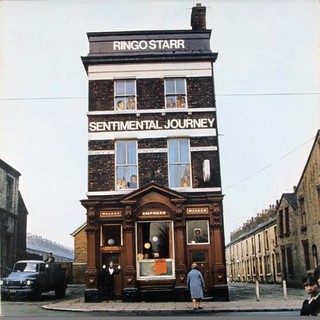
Sentimental Journey is the debut solo album by English rock musician Ringo Starr. It was released by Apple Records in March 1970 as the Beatles were breaking up. The album is a collection of pre-rock 'n' roll standards that Starr recalled from his childhood in Liverpool. As a departure from the experimental quality that had characterised solo LPs by George Harrison and John Lennon since 1968, it was the first studio album by an individual Beatle to embrace a popular music form.

"Old Brown Shoe" is a song by the English rock band the Beatles. Written by George Harrison, the group's lead guitarist, it was released on a non-album single in May 1969, as the B-side to "The Ballad of John and Yoko". The song was subsequently included on the band's compilation albums Hey Jude, 1967–1970 and Past Masters, Volume Two. Although "Old Brown Shoe" remains a relatively obscure song in the band's catalogue, several music critics view it as one of Harrison's best compositions from the Beatles era and especially admire his guitar solo on the track.

"It Don't Come Easy" is a song by English rock musician Ringo Starr that was released as a non-album single in April 1971. It was produced by Starr's former Beatles bandmate George Harrison, who also helped write the song, although only Starr is credited. Recording for the track took place in March 1970 at Trident Studios in London, with overdubs added in October. Starr and Harrison performed the song together in August 1971 at Harrison's Concert for Bangladesh shows in New York City, a recording from which was released on the live album of the same name. Starr has continued to perform it in subsequent decades with his All-Starr Band.
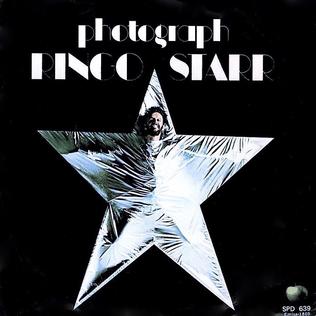
"Photograph" is a song by English rock musician Ringo Starr that was released as the lead single from his 1973 album Ringo. Starr co-wrote it with George Harrison, his former bandmate from the Beatles. Although they collaborated on other songs, it is the only one officially credited to the pair. A signature tune for Starr as a solo artist, "Photograph" was an international hit, topping singles charts in the United States, Canada and Australia, and receiving gold disc certification for US sales of 1 million. Music critics have similarly received the song favourably; Stephen Thomas Erlewine of AllMusic considers it to be "among the very best post-Beatles songs by any of the Fab Four".

The Best of George Harrison is a 1976 compilation album by English musician George Harrison, released following the expiration of his EMI-affiliated Apple Records contract. Uniquely among all of the four Beatles' solo releases, apart from posthumous compilations, it mixes a selection of the artist's songs recorded with the Beatles on one side, and later hits recorded under his own name on the other.
"I'm the Greatest" is a song written by English musician John Lennon that was released as the opening track of the 1973 album Ringo by Ringo Starr. With Starr, Lennon and George Harrison appearing on the track, it marks the only time that three former Beatles recorded together between the band's break-up in 1970 and Lennon's death in 1980. Lennon wrote the song in December 1970 as a wry comment on his rise to fame, and later tailored the lyrics for Starr to sing. Named after one of Muhammad Ali's catchphrases, the song partly evokes the stage-show concept of the Beatles' 1967 album Sgt. Pepper's Lonely Hearts Club Band.
Harrisongs Ltd is a music publishing company, founded in 1964 by English musician and songwriter George Harrison, then a member of the Beatles. On 11 September 1964, Harrison created Mornyork Ltd, which, by 7 December that year, had changed its name to Harrisongs Ltd. The company is headquartered at 27 Ovington Square in London's Knightsbridge district, in the same building that houses the Beatles' Apple Corps.

"Back Off Boogaloo" is a song by English rock musician Ringo Starr that was released as a non-album single in March 1972. Starr's former Beatles bandmate George Harrison produced the recording and helped Starr write the song, although he remained uncredited as a co-writer until 2017. Recording took place in London shortly after the pair had appeared together at Harrison's Concert for Bangladesh shows in August 1971. The single was a follow-up to Starr's 1971 hit song "It Don't Come Easy" and continued his successful run as a solo artist. "Back Off Boogaloo" peaked at number 2 in Britain and Canada, and number 9 on America's Billboard Hot 100. It remains Starr's highest-charting single in the United Kingdom.

The Beatles were an English rock band formed in Liverpool in 1960. With a line-up comprising John Lennon, Paul McCartney, George Harrison and Ringo Starr, they are commonly regarded as the most influential band of all time. Between 1964 and 1970, they appeared in five major motion pictures, beginning with A Hard Day's Night (1964) and ending with Let It Be (1970). From late 1965 to 1969, the group also appeared in several promotional films for their singles, which have been credited with anticipating music videos and the rise of MTV in the 1980s.
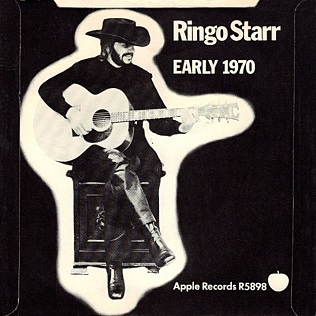
"Early 1970" is a song by English rock musician Ringo Starr that was released as the B-side of his April 1971 single "It Don't Come Easy". A rare example of Starr's songwriting at the time, it was inspired by the break-up of the Beatles and documents his relationship with his three former bandmates. The lyrics to the verses comment in turn on Paul McCartney, John Lennon and George Harrison as individuals, and the likelihood of each of them making music with Starr again. In the final verse, Starr offers a self-deprecating picture of his musical abilities and expresses the hope that all four will play together in the future. Commentators have variously described "Early 1970" as "a rough draft of a peace treaty" and "a disarming open letter" from Starr to Lennon, McCartney and Harrison.
"Sunshine Life for Me (Sail Away Raymond)" is a song by English musician Ringo Starr from his 1973 album Ringo. It was written by George Harrison, Starr's former bandmate in the Beatles, and was one of several contributions Harrison made to Ringo. Recording for the song took place in Los Angeles in March 1973, with Richard Perry as producer. In addition to Starr and Harrison, the musicians on the track include Levon Helm, Robbie Robertson, Rick Danko and Garth Hudson of the Band, and multi-instrumentalist David Bromberg.
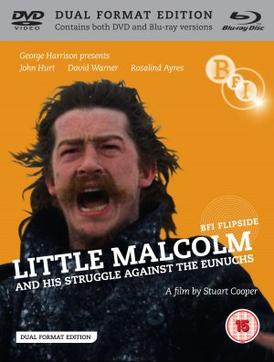
Little Malcolm is a 1974 British comedy drama film directed by Stuart Cooper. It was entered into the 24th Berlin International Film Festival where it won the Silver Bear.

"Ballad of Sir Frankie Crisp (Let It Roll)" is a song by English rock musician George Harrison from his 1970 triple album All Things Must Pass. Harrison wrote the song as a tribute to Frank Crisp, a nineteenth-century lawyer and the original owner of Friar Park – the Victorian Gothic residence in Henley-on-Thames, Oxfordshire, that Harrison purchased in early 1970. Commentators have likened the song to a cinematic journey through the grand house and the grounds of the estate.
"Six O'Clock" is a song by English rock musician Ringo Starr from his 1973 album Ringo. It was written by Starr's former Beatles bandmate Paul McCartney and the latter's wife, Linda, who also participated in the recording of the song. It was the first time McCartney and Starr had worked together since the Beatles' break-up in 1970. Their collaboration reflected an easing of the tensions that had existed between the two musicians for much of that period.
"You and Me (Babe)" is a song by English musician Ringo Starr, released as the final track on his 1973 album Ringo. Starr's fellow ex-Beatle George Harrison wrote the song along with Mal Evans, the Beatles' longtime aide and a personal assistant to Starr during the making of Ringo. The track serves as a farewell from Starr to his audience in the manner of a show-closing finale, by lyrically referring to the completion of the album. During the extended fadeout, Starr delivers a spoken message in which he thanks the musicians and studio personnel who helped with the recording of Ringo – among them, Harrison, John Lennon and Paul McCartney, and his producer, Richard Perry.
"I'll Still Love You" is a song written by English rock musician George Harrison and first released in 1976 by his former Beatles bandmate Ringo Starr. Produced by Arif Mardin, the track appeared on Starr's debut album for Atlantic Records and Polydor, Ringo's Rotogravure. The composition had a long recording history before then, having been written in 1970 as "Whenever", after which it was copyrighted with the title "When Every Song Is Sung".
Ring O' Records was a record label founded by former Beatle Ringo Starr in 1975. The label's formation coincided with the winding down of the Beatles' Apple Records and allowed Starr to continue supporting other artists' projects while maintaining his solo career. The label was shut down in 1978, having failed to achieve commercial success with a roster of artists that included David Hentschel, Bobby Keys, Graham Bonnet and Rab Noakes. Starr himself never recorded for Ring O' Records, although, following the expiration of his contract with Apple in January 1976, he signed with Polydor, which distributed his label throughout Europe. From 1977, Ring O' was distributed in some territories by Mercury Records.

The Singles Collection 1962–1970 is a series of reissued singles by the English rock band the Beatles. It was released in Britain on 5 March 1976 by EMI, following the expiration of the Beatles' contract with the company in January, and close to six years after the band's break-up. The collection comprises all 22 of the Beatles' UK singles, which were originally issued between October 1962 and March 1970 on either the Parlophone or Apple record labels, together with a new single pairing "Yesterday" with "I Should Have Known Better".
References
- ↑ Dover Express staff (30 August 2012). "Dover musician writes tribute to home town". Dover Express. Archived from the original on 5 May 2013. Retrieved 3 January 2016.
- ↑ Fort, Hugh (16 July 2010). "Clayson and the Argonauts return for reunion concert". GetSurrey.co.uk. Retrieved 5 September 2012.
- ↑ Fornatale, Peter; Corbett, Bernard M. (2013). 50 Licks: Myths and Stories from Half a Century of the Rolling Stones . New York, NY: Bloomsbury. p. 265. ISBN 978-1-60819-921-1.
- 1 2 3 4 5 Hamilton, Stuart A. (2005). "Feature: Alan Clayson". getreadytorock.com. Retrieved 2 January 2016.
- ↑ Clayson, Alan (2003). George Harrison. London: Sanctuary. p. 236. ISBN 1-86074-489-3.
- ↑ Clayson, Alan. "Alan Clayson and The Argonauts". Damaged Goods Records . Retrieved 2 January 2016.
- ↑ Mojo: The Beatles' Final Years Special Edition. London: Emap. 2003. p. 7.
- ↑ Inglis, Ian (2010). The Words and Music of George Harrison. Santa Barbara, CA: Praeger. p. 173. ISBN 978-0-313-37532-3.
- ↑ "The Beatles Box by Alan Clayson". goodreads . Retrieved 2 January 2016.
- 1 2 Ingham, Chris (2006). The Rough Guide to the Beatles (2nd edn). London: Rough Guides/Penguin. p. 281. ISBN 978-1-84836-525-4.
- ↑ Allen, Jeremy (1 December 2013). "Tome on the Range: Reverential Whispers: Darran Anderson's Histoire De Melody Nelson". The Quietus . Retrieved 2 January 2016.
- ↑ Fox, Dan (March 2003). "Dan Fox on Alan Clayson's biography of Edgard Varèse". Frieze . Archived from the original on 7 December 2015. Retrieved 2 January 2016.
- ↑ "Books by Alan Clayson". goodreads . Retrieved 2 January 2016.
- ↑ "Alan Clayson: Credits". AllMusic . Retrieved 2 January 2016.